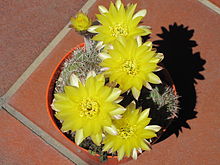Echinopsis aurea
| Echinopsis aurea | |
|---|---|

| |
| Scientific classification | |
| Kingdom: | Plantae |
| Clade: | Tracheophytes |
| Clade: | Angiosperms |
| Clade: | Eudicots |
| Order: | Caryophyllales |
| Family: | Cactaceae |
| Subfamily: | Cactoideae |
| Genus: | Echinopsis |
| Species: | E. aurea |
| Binomial name | |
| Echinopsis aurea Britton & Rose | |
| Synonyms | |
| |
Echinopsis aurea, is a species of Echinopsis cactus found in Argentina.[2]
Description
Echinopsis aurea grows singly or in groups. The spherical to short cylindrical, dark green shoots reach heights of growth of 5 to 10 cm (2.0 to 3.9 in) with a diameter of 4 to 6 cm (1.6 to 2.4 in). There are 14 to 15 sharp, distinct ridges separated by deep furrows. The brownish areoles on it are up to 1 cm (0.39 in) apart. Brownish to black spines towards the base of the shoots emerge from them, which have yellowish tips. The usually four central spines that are strong, often flattened, 2 to 3 cm (0.79 to 1.18 in) long. The eight to ten spread radial spines have a length of up to 1 cm (0.39 in). The mostly shiny lemon yellow, rarely white or red flowers appear in groups on the side of the shoots and open during the day. They are up to 9 cm (3.5 in) long and reach a diameter of 8 cm (3.1 in). The egg-shaped fruits are semi-dry and tear open.[3]
Distribution
Echinopsis aurea is widespread in the Argentine provinces of Salta, Santiago del Estero, Catamarca, La Rioja, San Luis and Córdoba at altitudes of 500 to 1500 meters.
Taxonomy
The first description by Nathaniel Lord Britton and Joseph Nelson Rose was published in 1922.[4] The specific epithet aurea comes from Latin and means 'yellow'. Nomenclatural synonyms are Lobivia aurea (Britton & Rose) Backeb. (1934), Pseudolobivia aurea (Britton & Rose) Backeb. (1951), Salpingolobivia aurea (Britton & Rose) Y.Itô (1957), Hymenorebutia aurea (Britton & Rose) F.Ritter (1980) and Lobivia shaferi subsp. aurea (Britton & Rose) E. Herzog (1985).
References
- ^ "The IUCN Red List of Threatened Species". IUCN Red List of Threatened Species. 2010-09-20. Retrieved 2023-11-26.
- ^ "Echinopsis aurea". Tropicos. Retrieved 2019-08-22.
- ^ Anderson, Edward F.; Eggli, Urs (2005). Das grosse Kakteen-Lexikon (in German). Stuttgart (Hohenheim): Ulmer. pp. 218–219. ISBN 3-8001-4573-1.
- ^ Britton, Nathaniel Lord; Eaton, Mary E.; Rose, J. N.; Wood, Helen Adelaide (1919). The Cactaceae : descriptions and illustrations of plants of the cactus family. Washington: Carnegie Institution of Washington. doi:10.5962/bhl.title.46288.
External links
 Media related to Echinopsis aurea at Wikimedia Commons
Media related to Echinopsis aurea at Wikimedia Commons Data related to Echinopsis aurea at Wikispecies
Data related to Echinopsis aurea at Wikispecies

